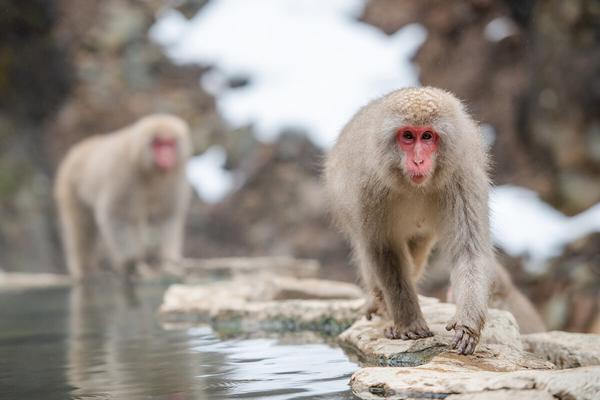
At least since Makak Naruto's selfie, everyone of us knows macaques. But what do we know about these fascinating primates, other than that they love to take photos of themselves? We at PETA Germany have put together seven exciting facts about macaques that will surprise you.
1. Macaques belong to the "old breed"
Macaques belong to the so-called Old World monkeys that live in Africa and Eurasia. Unlike New World monkeys, most Old World monkeys can position their thumbs opposite the other fingers—they don't use their tails to grasp. Also, Old World monkeys are usually larger than New World monkeys. [1]
2. Macaques wash their food
A group of Japanese macaques showed they had a culture of their own when the animals began washing their food. Some macaques introduced this ritual to the group, and the rest embraced the innovation. Eventually, washing became the cultural norm in this particular group. [2]

3. Macaques learn from each other
Such behavior as washing food can no longer be attributed to instinct alone. This group has proven that apes have unique individual and group identities and that they learn, improvise and pass on their knowledge just like humans.
4. Macaques are intelligent
Like all primates, macaques have enormous intellectual abilities. For example, you can count and understand the connections between numbers. [3] They use tools, such as using hair as dental floss. [4]
5. Macaques like to take a hot bath
A group of macaque monkeys living on the Japanese island of Honshu showed another example of a unique culture by bathing in the hot springs in winter. [2]
6. Macaques have complex social systems
Macaques have enormous social intelligence. They live in interactive associations consisting of 80 to 100 members and lead and recognize complex relationships. A young female rhesus macaque stays with her mother and sisters throughout her life to assimilate into "one of the most intimate and complicated social systems known in the animal kingdom," according to noted primatologist Frans de Waal. [5]
7. Macaques are true athletes
Macaques have outstanding physical abilities. Some species live in cold areas, others in hot areas. Some are very good climbers and live mainly in trees, while others live on the ground. Some are great swimmers.
Macaques suffer in animal testing laboratories
Unfortunately, two species of macaques, namely the rhesus and cynomolgus monkeys, are still being abused, tortured, maimed and killed in cruel experiments in laboratories. The animals are exposed to a wide variety of atrocities: psychological experiments such as attempts to deprive the mother, in brain research or in toxicity studies.
In the laboratory, the social animals are denied everything natural in tiny, bare cages. They often don't have enough job opportunities or variety, which is why they can engage in stereotypical behavior, such as endlessly spinning in circles, bobbing, or self-mutilating.
Note: PETA consistently rejects animal testing. However, the studies mentioned, which show the cognitive, social or other abilities of the animals, already exist and provide scientific evidence for the behavior and suffering of the animals. Even if animals have suffered in laboratories for this proof, the results must be made public, because they show how fascinating, intelligent, worthy of protection and how similar the animals are to us.
Here's how you can help macaques
In Germany alone, 3,000 primates are used in animal experiments every year, although the results can hardly be extrapolated to humans. Help by supporting our strategy to phase out animal testing with your signature!
Now phase out animal testing support buzzwords






